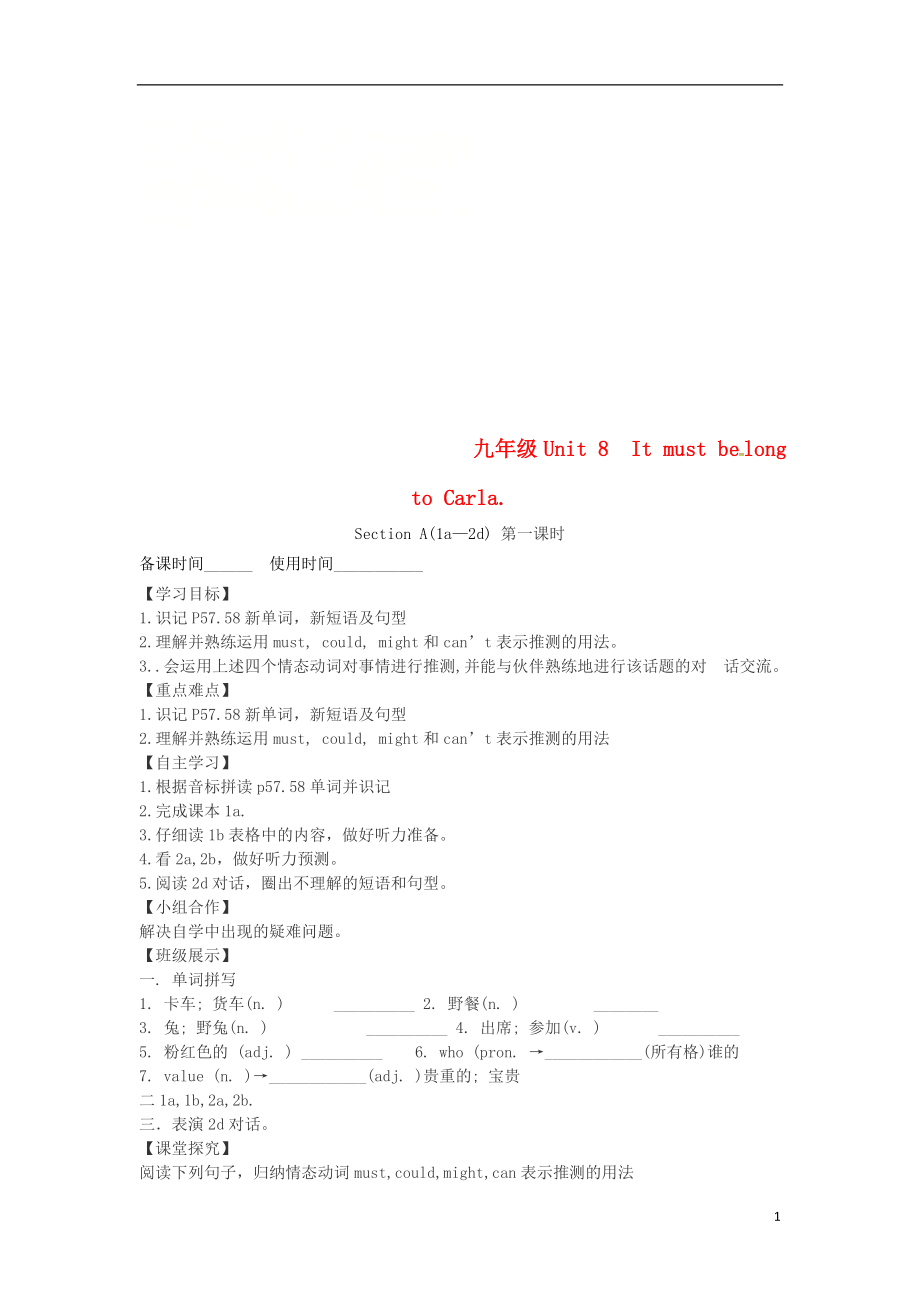《山西省運(yùn)城市垣曲縣九年級(jí)英語(yǔ)全冊(cè) Unit 8 It must belong to Carla(第1課時(shí))Section A(1a-2d)學(xué)案(無(wú)答案)(新版)人教新目標(biāo)版》由會(huì)員分享,可在線閱讀�,更多相關(guān)《山西省運(yùn)城市垣曲縣九年級(jí)英語(yǔ)全冊(cè) Unit 8 It must belong to Carla(第1課時(shí))Section A(1a-2d)學(xué)案(無(wú)答案)(新版)人教新目標(biāo)版(3頁(yè)珍藏版)》請(qǐng)?jiān)谘b配圖網(wǎng)上搜索�。
1、
九年級(jí)Unit 8 It must belong to Carla.
Section A(1a—2d) 第一課時(shí)
備課時(shí)間______ 使用時(shí)間___________
【學(xué)習(xí)目標(biāo)】
1.識(shí)記P57.58新單詞�,新短語(yǔ)及句型
2.理解并熟練運(yùn)用must, could, might和can’t表示推測(cè)的用法。
3..會(huì)運(yùn)用上述四個(gè)情態(tài)動(dòng)詞對(duì)事情進(jìn)行推測(cè),并能與伙伴熟練地進(jìn)行該話題的對(duì) 話交流�。
【重點(diǎn)難點(diǎn)】
1.識(shí)記P57.58新單詞,新短語(yǔ)及句型
2.理解并熟練運(yùn)用must, could, might和can’t表示推測(cè)的用法
【自主學(xué)習(xí)】
1.根據(jù)音標(biāo)拼讀p57
2�、.58單詞并識(shí)記
2. 完成課本1a.
3. 仔細(xì)讀1b表格中的內(nèi)容,做好聽(tīng)力準(zhǔn)備�。
4. 看2a,2b�,做好聽(tīng)力預(yù)測(cè)�。
5. 閱讀2d對(duì)話,圈出不理解的短語(yǔ)和句型�。
【小組合作】
解決自學(xué)中出現(xiàn)的疑難問(wèn)題。
【班級(jí)展示】
一. 單詞拼寫(xiě)
1. 卡車(chē); 貨車(chē)(n. ) __________ 2. 野餐(n. ) ________
3. 兔; 野兔(n. ) __________ 4. 出席; 參加(v. ) __________
5. 粉紅色的 (adj. ) __________ 6. who (pron. →____________(所有格)誰(shuí)的
3�、
7. value (n. )→____________(adj. )貴重的; 寶貴
二1a,1b,2a,2b.
三.表演2d對(duì)話。
【課堂探究】
閱讀下列句子�,歸納情態(tài)動(dòng)詞must,could,might,can表示推測(cè)的用法
1. Your book may/might/could be on the
bed, but I’m not sure. The book must be Li Lei’s because his
name is on it.
2. The man under the tree can’t be Mr. Green. He went to Bei
4、jing yesterday.
No one told him the news, so he can’t know it.______________________
2. belong to屬于
【語(yǔ)境領(lǐng)悟】
*It must belong to Carla. 它一定屬于卡拉�。
*The dictionary belongs to him. =The dictionary is his. 那本詞典是他的。
【自主歸納】
belong to意為“屬于”, to是介詞, 后接____或人稱(chēng)代詞的____形式表示“某物屬于某人”
【妙辨異同】
belong
5�、 to sb. 和be sb. ’s
兩者的意思是相同的, 意為“屬于某人(是某人的)”, 但用法不同。
(1)belong to sb. 意為“屬于某人”, 是個(gè)動(dòng)詞詞組, to是介詞, 后接名詞或人稱(chēng)代詞的賓格形式�。
(2)be sb. ’s意為“是某人的”, be是個(gè)連系動(dòng)詞, 其后應(yīng)接名詞的所有格形式或名詞性物主代詞形式。
anybody pron. 任何人
【語(yǔ)境領(lǐng)悟】
*I’ll call them now to check if anybody has it.
我現(xiàn)在就給他們打電話看看是否有人撿到它�。
*Did you meet anybody interest
6、ing?
你遇到了有趣的人嗎?
*Is there anybody in the classroom? 教室里有人嗎?
【自主歸納】
(1)anybody為不定代詞, 相當(dāng)于anyone�。常用于__________ (肯定/否定)句和疑問(wèn)句; 用于肯定句時(shí), 意為“任何人; 隨便哪個(gè)人”。
(2)當(dāng)有形容詞修飾時(shí), 形容詞要放在它的__________ (前面/后面)�。
(3)anybody作主語(yǔ)時(shí), 謂語(yǔ)動(dòng)詞用__________ (單/復(fù))數(shù)形式。
【達(dá)標(biāo)練習(xí)】
Ⅰ. 用所給詞的適當(dāng)形式填空
1. The dictionary is__________ (value
7�、), but he lost it.
2. Your bike can’t__________ (steal). You must forget where you put it.
3. I’ll call him up__________ (make) sure of it.
4. J. K. Rowling is a great__________ (write). Her novels are popular among people, especially young people.
5. He__________ (attend) an important meet
8、ing last week.
Ⅱ. 單項(xiàng)選擇
1. —______sweater is this?
—I don’t know. Please go and ask Lily.
A. Who B. Whose C. Which D. Whom
2. The boy______be Jim, but I’m not sure.
A. can’t B. might C. have to D. must
3. Whenever he sees waste things, he always______and puts them in the dust
9�、bin(垃圾箱).
A. picks them up B. picks up them C. takes them up D. takes up them
4. “The CD must be Tom’s”means“the CD must______Tom”.
A. take to B. live to C. belong to D. get to
5. Can you tell me______there’s a bookstore near here?
A. that B. what C. if D. which
3
 山西省運(yùn)城市垣曲縣九年級(jí)英語(yǔ)全冊(cè) Unit 8 It must belong to Carla(第1課時(shí))Section A(1a-2d)學(xué)案(無(wú)答案)(新版)人教新目標(biāo)版
山西省運(yùn)城市垣曲縣九年級(jí)英語(yǔ)全冊(cè) Unit 8 It must belong to Carla(第1課時(shí))Section A(1a-2d)學(xué)案(無(wú)答案)(新版)人教新目標(biāo)版

